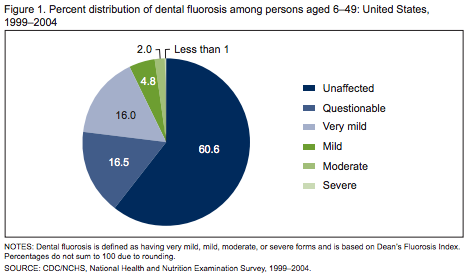The widespread use of fluoride in drinking water has become increasingly challenged by doctors and other public health experts. Fluoride has an extremely limited cost-benefit window, that is, that there is increasing evidence of harm where there is little or no evidence of actual benefit.
Dental Fluorosis
Dental fluorosis is a visible change in the structure of the tooth. In mild forms, it is observable as white spots on the teeth, while in more severe cases it can lead to brown mottling on the teeth, having the appearance of teeth that are rotten and falling apart. According to CDC, 41% of children aged 12-15 have some form of fluorosis, a percentage that has been steadily increasing.
Decreased IQ and Cognitive Impairement
Fluoride in drinking water supplies has been associated with a decrease in IQ, having possible implications for other cognitive impacts during development. One of the most recent studies in this area was done by Anna Choi and Dr. Philippe Grandjean working with a team at the Harvard School of Public Health. Their review of 27 studies found “strong indications” that fluoride in drinking water may have a negative impact on the cognitive development of children.
“Fluoride seems to fit in with lead, mercury, and other poisons that cause chemical brain drain,” Grandjean says. “The effect of each toxicant may seem small, but the combined damage on a population scale can be serious, especially because the brain power of the next generation is crucial to all of us.”
See the Harvard School of Public Health’s discussion of the study here.
Contact Us
If you or a loved one believe that you have suffered from fluoridated drinking water, toothpastes, or fluoride supplements, you may be entitled to file a claim against the manufacturer or provider of the fluoride. Please fill out the fluoride questionnaire and provide us with additional information about you our your child’s injury.
The time to file such a claim is limited. Do not wait to contact us, or another attorney of your choice, to investigate your potential claim.

